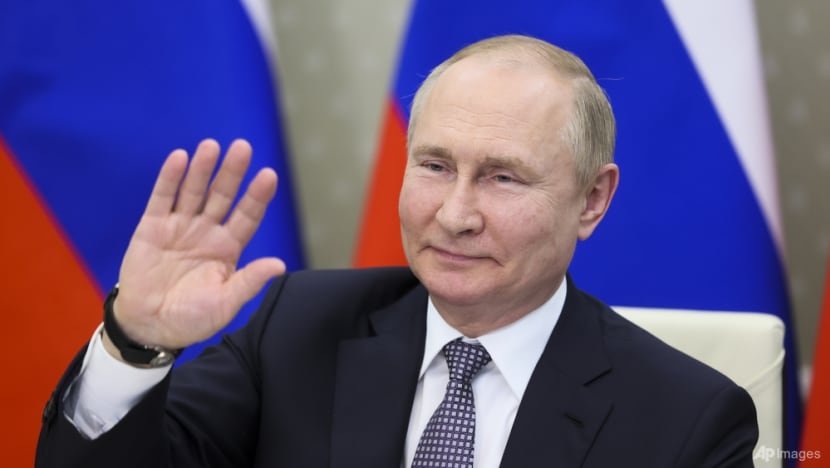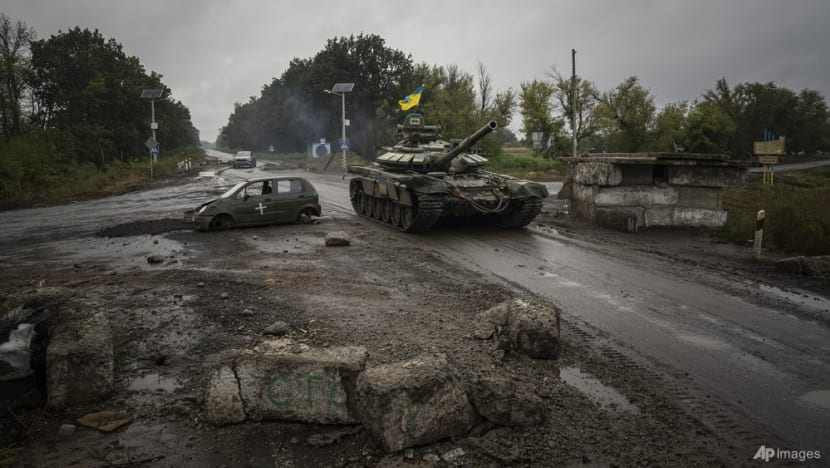Commentary: An off-ramp for Vladimir Putin is repugnant but necessary
Russia’s defeats on the battlefield create an opening to bring the war to a close without risking catastrophe, says Bloomberg Opinion’s Clive Crook.

WASHINGTON DC: From the outset of Russia’s war on Ukraine, the crucial question hasn’t changed: Can Russian President Vladimir Putin be defeated at an acceptable cost? Despite all we now know about Russia’s military incompetence and the courage and skill of Ukraine’s forces, the answer is still uncertain.
This leads to an uncomfortable conclusion, one that US President Joe Biden showed no trace of understanding in his speech at the United Nations on Wednesday (Sep 21): Planning for the end of this conflict needs to weigh outcomes that are disappointing, even disgraceful, for the sake of avoiding those that are catastrophic.
The idea of an off-ramp for Putin strikes many as repugnant - and now, for good measure, entirely unnecessary. Ukraine is winning. Why help Russia snatch so much as a partial victory from the jaws of defeat?
The “Ukraine must win” chorus never clearly sets out what Russia’s defeat really involves. Perhaps it means that Russia is pushed back behind its pre-2014 borders and then just comes to terms with it.
Or maybe Putin’s humiliation causes domestic opposition to explode and he’s removed; his successor is someone the West can do business with; Russia’s claims to superpower status collapse; and its demotion to second-tier status is acknowledged and accepted.
All good stuff, to be sure, and nothing is impossible. But, to put it mildly, these futures aren’t assured.
CAN WE COUNT ON PUTIN NOT TO BE RECKLESS?
As governments gathered for the UN meeting, Putin announced his intention to prolong the war with a “partial mobilisation” that in due course will field another 300,000 soldiers. And he underlined his threat to use nuclear weapons: “Russia will use all the instruments at its disposal to counter a threat against its territorial integrity. This is not a bluff.”
Soon that notion of territorial integrity might include areas Russia currently occupies and intends to annex.
I keep reading that one should be aware of Putin’s nuclear threats but not intimidated by them. Call me a coward, but I find it difficult to think about Armageddon without being a little intimidated - and I ask the same of my political leaders.
If at all possible, it’s better to avoid than invite mass death and destruction. Of course, simply surrendering in the face of such threats would assure defeat - but one can be rationally intimidated, and respond accordingly, without surrendering. That’s what mutually assured destruction is supposed to mean.
Am I exaggerating the danger? Won’t Putin be deterred from using nuclear weapons if he’s threatened with a proportionately drastic response? Again, maybe - but what’s the deterrent, exactly?
It’s hard to see how sanctions could be made much tougher, not least because they’re already causing great damage beyond Russia. Having gone to such lengths to support Ukraine without putting any of its own forces at risk, can the US credibly threaten (as some advise) to attack Russia in response to a tactical nuclear strike - let alone credibly threaten a nuclear response?
Supposing the threats and counter-threats evolve in that direction, note a worrisome dissonance in much of the analysis of Putin’s calculations. His attack on Ukraine was judged to be not just deplorable but also reckless.
Yet he is expected to parse the pros and cons of “escalating to de-escalate” as prudence demands. What could possibly go wrong?
A DEEPLY UNSATISFYING RESULT
Ukraine’s remarkable battlefield successes create an opening to bring the war to a close without running these extraordinary risks. What’s needed now is a settlement that lets Putin claim a victory that everybody else understands to be a defeat.
This could emerge from negotiations in a variety of different forms. But imagine, to begin with, a ceasefire that set borders according to current battle lines, with a longer-term outcome that ceded some territory to Russia while admitting most of today’s Ukraine to North Atlantic Treaty Organization (NATO).
Until recently, Putin would have deemed this unacceptable. Now it might not look so bad.
Of course, Ukraine and its most ardent supporters would hate it too. Rewarding Russia’s hostility with territory and sustaining Putin in power seem unconscionable.
But it has been a grave mistake throughout for the US and its friends to defer as much as they have to Ukraine’s judgment of what’s at stake and how much risk to run. Ukraine’s interests and calculations of warranted sacrifice are aligned with those of the West, but not identical to them.
Most of the world would see a negotiated outcome not as Ukraine might, but as a salutary defeat for Russia.
The suggestion that Putin would simply pause, gather strength, and then renew his wars of expansion in pursuit of Greater Russia is a stretch. The course of the war has underlined the limits of Russia’s power, tested the patience of its allies, and cemented the capacity of the West to challenge its actions.
The total humiliation of Putin, or his removal from power, isn’t necessary to drive this home.
Accepting this deeply unsatisfying result would lessen the risk of a catastrophic wider conflict. It’s a price worth paying.















